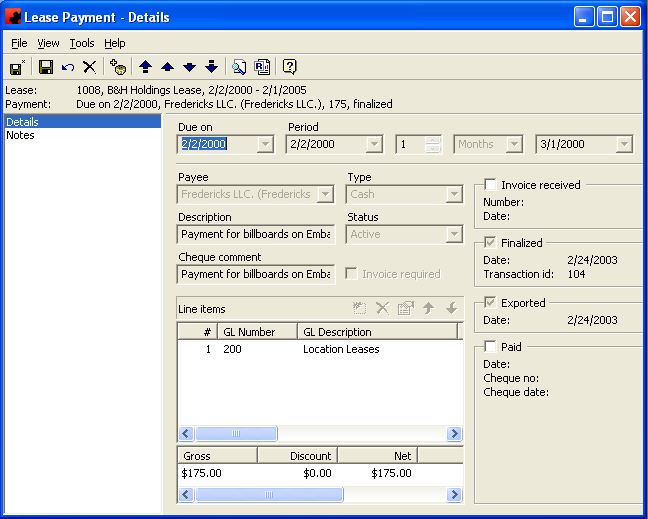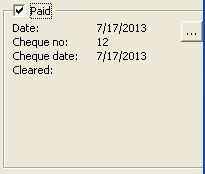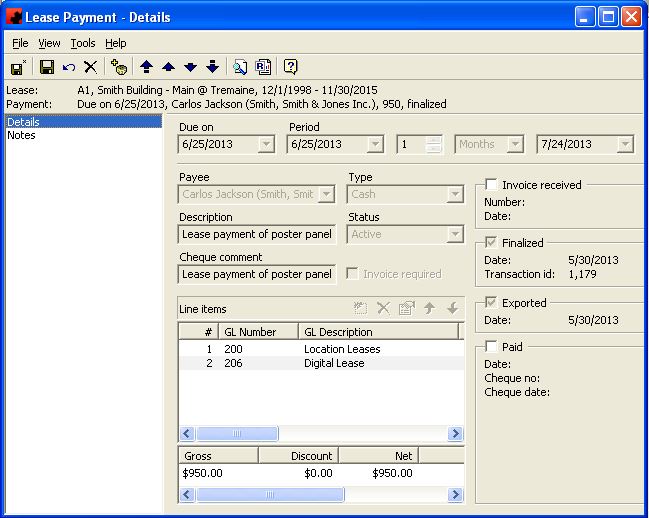Lease payment
Contents |
Modifying Lease Payments
To make revisions to a Payment in Ad Manager, first find the particular Payment that requires changes. You can either choose the Payment from the listing of all Lease Payments or select the Lease and click on the Payments page to obtain the list of Payments for that Lease. Double click on the Payment you wish to revise and the following screen will appear:
Changing a Single Payment
If you wish to change information about a single Payment (e.g. adding a one time special payment or charge), this can be done from the Payments Page of the Lease.
To make the change, double click on the Payment you wish to modify. The Lease Payment - Details screen will open where you can make any changes specific to this Payment. Once you have made the necessary changes, click on the Save button.
NOTE 1: You might want to record why this Payment has been changed. Click the Notes Page of the Payment and make your remarks here. This will be saved with the changed Payment for further reference.
NOTE 2: You cannot delete a single payment in Ad Manager; to skip a Payment or not have it exported to your Accounting Package, change the type to Cancelled on that Payment and save it.
NOTE 3: If a Payment has been finalized and/or exported from Ad Manager, it cannot be modified. In order to make changes, the Export Status needs to be reset, and/or the Payment un-finalized.
Changing All Payments
If you wish to change a characteristic about all Payments (e.g. change of Recurrence, cheque comment, etc.) of a particular Payment Schedule, this can be done from the Details Page or Recurrence Page of the Payment Schedule as appropriate. Find the Payment Schedule, either from a list of all Lease Payment Schedules or from the corresponding Lease. Double click the item to open it and make the necessary changes. After you have made your changes, click on the Save button.
NOTE 1: You might want to record why this Payment Schedule has been changed. Click the Notes Page of the Payment Schedule and make your remarks here. This will be saved with the changed Payment Schedule for further reference.
NOTE 2: If any Payments have been exported from Ad Manager, they will not reflect the changes. Only non-exported Payments will change.
Removing a Non-Standard Payment
If you have altered one or more of the Payments to be different from the standard Payments that were set up using the Details Page or Recurrence Page from the Lease Payments Schedules, you can delete these Payments by highlighting them on the Payments Page and clicking on the Delete button. This will reset the Payments to the default Payment Schedule.
NOTE: This will only work if the Payments have not been exported from Ad Manager.
Calculating a Percentage Lease Payment
If you are using Ad Manager allocations for all bills, and all sites have been correctly assigned to each lease, Ad Manager can be used to assist in the calculation of percentage leases. For information on how to calculate the allocated amount on a lease payment line item to determine your percentage lease payment, click here. To find out more about how to use the View Allocated Revenue tool, click here.
Processing Lease Payments
Finalizing Payments
Finalizing a Payment will prevent you from making additional changes to it. This can be done manually prior to a Lease Export, or it will automatically occur during the Export if you are running the Exporter within Ad Manager. If you wish to finalize payments manually, use the Find tool and look for Lease Payments that meet your criteria. Highlight the Lease Payments you wish to finalize and go to the Tools menu and click Finalize. Ad Manager will finalize these Payments. If you were to open the Payment details screen, Ad Manager will show the Payment as Finalized with a Unique Transaction ID.
Prior to Finalizing your Payments, you might wish to Customize the View of your Payments list to add a column called "Exportable". This column will tell you, even though you have Finalized the Payments, if it can be contained in the Export file of Payments. If the field is blank, double click the Payment(s) to determine why the Payment cannot be exported (e.g. It's marked as In Dispute, the Invoice is not marked as being received, etc.), make the necessary changes and save. Again, you are double checking your Payments to make sure that everything is correct prior to the export.
Once a Payment is marked as Finalized, you cannot change the information of the Payment. You must Un-Finalize it in order to make changes.
Un-Finalizing Payments
If a Payment has incorrectly been marked as Finalized, Ad Manager provides you with the ability to Un-Finalize it. To Un-Finalize a Payment, find it either with a Finder, from a listing of Lease Payments or from the Payments page of a Lease. Right click on the Payment you wish to Un-Finalize, go to the Tools menu and select Un-Finalize. Ad Manager will remove the Finalized status, but will still show a Unique Transaction ID, indicating this Payment was Finalized at one time.
Exporting Payments
There are several ways lease payments can be exported out of Ad Manager, depending on the connection that has been created for your organization. For information about how you can export your lease payments to your accounting system, please contact our Services team.
Marking a Lease Payment as Paid
If you wish to track, in Ad Manager, whether a Lease Payment has been made, you can do so from the Payments Page of the Lease. Some Ad Manager exporters will automatically fill this information in, however you can do it manually if this option is not available.
Double click the Payment and the screen above will appear. From this screen, click the box beside Paid. Ad Manager will ask you for the date paid, cheque number and status information.
Complete the information as appropriate and click OK. Click the Save button to keep your changes.
Lease Payment Pages
Details Pages
The Details Page is where information about the Lease Payment is displayed. Information on the status of the Lease Payment, on who the Payee is, and what the line items for this payment are can be found on this page.
For information on the buttons that appear at the top of the window, click here. For information on the menu items that appear under the Tools menu, click here.
The Line items pane shows a listing of all Line Items that are assigned to this Payment. The functions available through the buttons immediately above the pane are:
- Add a new Line Item to the Payment. Click on this button and the Payment Line Item screen will open where you enter in a description for the Line item, as well as the GL Code to which this Line item is assigned.
- Delete the highlighted Line item from the Payment.
- Edit the information for the highlighted Line item.
- Move the highlighted Line item up in the list of Line items.
- Move the highlighted Line item down in the list of Line items.
Fields
Cheque Comment: This is what you would like to appear as a memo item on the cheque.
Description: This is a quick description of what this Lease Payment pertains to. This description is for internal use only.
Due On: This is the date the payment is due to be paid.
Exported: Once the payment has been exported out of Ad Manager, this checkbox will contain a checkmark, and the date the payment was exported will be shown in the Date field below it.
Finalized: This checkbox can be clicked to finalize the payment for exporting. Finalizing the payment will prevent you from making additional changes to it. This can be done manually before the Export, by clicking on the Finalized checkbox, or automatically during the export. Once the payment has been finalized, the date it was finalized will show below the check box as well as a unique transaction id.
Invoice Received: If you have a Lease that requires an invoice be received prior to payment, you can mark the invoice has been received here by clicking in the box beside Invoice Received. Ad Manager will then ask you for the invoice date and number. Once the information has been entered here, you can still modify it by clicking on the ellipsis () button next to the date.
Invoice Required: This check box allows you to identify whether a Lease Payment will only be issued when an invoice is received from the Payee. To identify that the Lease Payment requires an invoice, check the box next to Invoice Required. Any Payment with this box checked will not export until the Invoice Received Box has been checked and the details are entered on the Payment.
Line Items: This is a listing of items that are included on this Payment. These are carried over from the Payment Schedule. However, if you wish to add a one time special payment or charge, you can do that here on the individual payment.
Paid: If you wish to track whether a Lease Payment has been made, you can do so by clicking the box beside Paid. Ad Manager will ask you for the date paid, cheque number and status information for this payment. Once the information has been entered here, you can still modify it by clicking on the ellipsis () button next to the date.
Payee: This is the person(s) or company that will be paid for this Payment. You can select the appropriate Payee from the list or add them in by typing the appropriate name in the field.
Period: This is the Lease date range for which this payment applies. The period dates are automatically created when the Lease Payment Schedule was saved. The dates are dependent upon information you input on the Recurrence page of the Payment Schedule and if you identified them as Paid in Advance or not. The period dates can be exported to your accounting package to appear on the cheque for this payment. However, you can modify the period dates for an individual Payment here.
Status: This is a list allowing you to identify whether the Payment is Active, Cancelled, In Dispute, On Hold or Suspended. Only Lease Payments identified as Active can be exported from Ad Manager to your accounting package.
Type: This is a list allowing you to identify whether this Lease Payment is for Cash, Trade, or Other.
At the bottom of the page, you can view a summary identifying all dollar amounts for this Payment.
Notes Page
For more information on the Notes page, click here.


